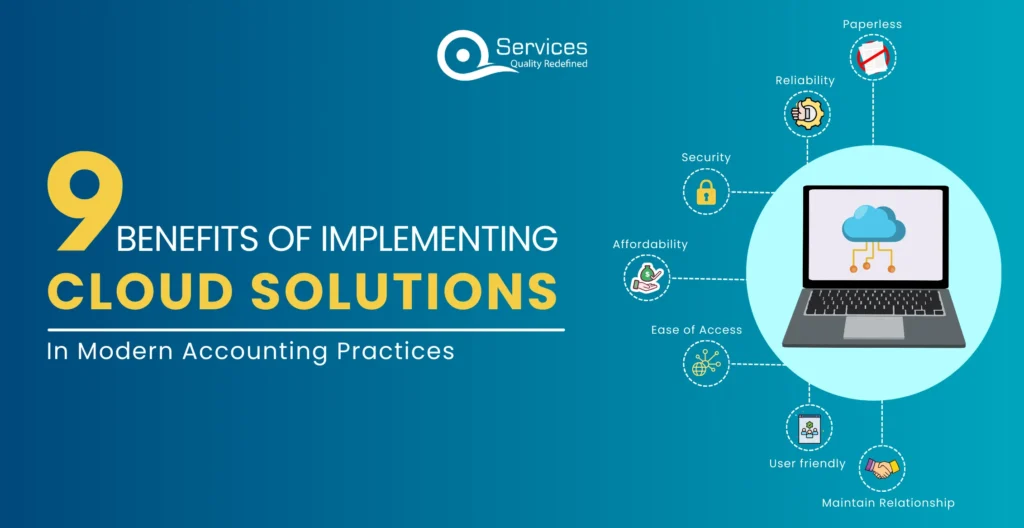Home » 9 Benefits of Implementing Cloud Solutions in Modern Accounting Practices

Cost reduction is the most common parameter for which every industry is striving, as lower costs not only provide a competitive advantage by enabling lower prices, but also directly contribute to increased profitability.
In tough economic times, cost reduction is crucial for survival, enabling investment in technology and ensuring regulatory compliance while maintaining profitability. According to a report by Deloitte, 78% of financial institutions have realized cost savings through the adoption of cloud technology. In this blog we will explore that how cloud solutions are evolving accounting practices.
Using software hosted on distant servers to manage financial transactions, accounting duties, and bookkeeping activities is known as cloud-based accounting or internet-based accounting. Accounting cloud software, which functions online as opposed to traditional accounting software that is installed locally, offers benefits like scalability, accessibility, automated upgrades, strong data protection, and cost savings through subscription-based models. With minimal upfront hardware expenditures or significant IT maintenance required, this method enables faster financial operations and permits remote work, real-time communication, and effective financial data management.
Get free Consultation and let us know your project idea to turn into an amazing digital product.
A significant 67% of accountants express a preference for cloud accounting. They believe that integrating cloud technology enhances the success of their businesses.
Cloud-based accounting transforms financial management by providing cost efficiency, accessibility, and scalability. Unlike traditional on-premises systems, it eliminates the need for costly local servers, enabling businesses to pay solely for the services they utilize. This allows accountants and finance professionals to work from any location, accessing vital data seamlessly. Regular automatic updates ensure the system stays current, while robust security measures safeguard sensitive information. Real-time collaboration facilitates communication, and automation simplifies tasks. In essence, cloud-based accounting offers agility, cost savings, and heightened security, rendering it indispensable for modern financial operations.
Cloud-based accounting software offers numerous benefits over traditional on-premises systems. By utilizing a cloud system, businesses can offload the responsibility of hosting and updating accounting software to the provider, thereby reducing the need for in-house IT infrastructure and maintenance. Let’s explore some of its benefits:
With cloud computing accounting software, businesses no longer need to spend time and effort installing software on individual computers, worrying about backups, or managing physical servers. Instead, all accounting data is securely stored and managed in the cloud, accessible from any internet-connected device. By eliminating these time-consuming tasks, businesses can redirect their resources towards more productive activities such as strategic planning, client interactions, and business growth initiatives.
Accounting cloud services offer users the convenience of accessing their accounting software through the internet with this they can use it from anywhere with an internet connection. This automatic update system ensures that users are constantly using software that is compliant with the latest tax rates and accounting regulations. Tax laws and accounting standards can change frequently, and it’s crucial for businesses to stay in compliance to avoid penalties or errors in financial reporting. With accounting cloud services, users know that their software is always aligned with the latest requirements, without needing to manually check for updates or install new versions themselves.
Cloud-based platforms utilize advanced algorithms and integrations with financial institutions to automate accounting and banking tasks. For transaction importation, these platforms connect directly to bank feeds, enabling automatic retrieval and categorization of transaction data. It streamlines Invoice generation through templates and automation rules, where user-defined criteria trigger the creation and delivery of invoices. It can automate tax calculations by using built-in tax rules and algorithms, ensuring accurate computations based on transaction data.
Cloud-based accounting software ensures compliance with modern accounting processes through real-time updates on regulations like GAAP, providing global accessibility and notifications for non-compliance. It maintains data accuracy and integrity with robust validation and reconciliation processes, including encryption and regular audits. Additionally, it automates tax-related processes to minimize errors and ensure accurate financial statements and tax reports, thereby helping businesses avoid audits, fines, and unnecessary payments.
Instead of relying on physical documents, businesses can scan or directly upload electronic copies of invoices, receipts, and other relevant documents to the cloud accounting platform. These documents are then stored digitally in a secure online environment, eliminating the need for physical storage space and reducing the risk of loss or damage. Additionally, cloud accounting software often integrates with other digital tools, such as email and document management systems, allowing for seamless electronic communication and document sharing. By transitioning to a paperless workflow, businesses minimize paper waste and contribute to a more sustainable environment.
Cloud providers protect sensitive financial data using cutting-edge security techniques. Data is encrypted to prevent unauthorized decoding. Frequent backups create multiple copies of the data, ensuring protection against loss from cyberattacks or system failures. Access controls reduce the likelihood of illegal access by limiting who can view or alter data. Strong authentication procedures also confirm users’ identities before granting access to data. Regular updates to security policies and ongoing monitoring further enhance protection, guaranteeing that data remains safe from evolving threats.
Cloud-based accounting solutions offer businesses the ability to easily adjust and expand their financial systems as they grow. Unlike traditional desktop software, cloud platforms can seamlessly add features, support more users, and adapt to increasing demands without the constraints of physical limitations. This scalability ensures that businesses can quickly respond to changing needs without the hassle of manual upgrades or maintenance, enabling them to focus on strategic priorities and seize opportunities for growth.
Cloud accounting systems revolutionize the way financial data is managed by leveraging automation and streamlined workflows, resulting in heightened accuracy. Through the meticulous recording and processing of data without human intervention, these systems effectively mitigate the risk of errors. By eliminating the need for manual entry and automating various processes, such as data reconciliation and transaction categorization, cloud accounting software significantly reduces the likelihood of inaccuracies in financial records. These inaccuracies encompass a spectrum of potential errors, ranging from simple miscalculations and incorrect figures to more complex issues like duplicate entries or inconsistencies in reporting.
Cloud accounting systems facilitate seamless collaboration among team members, enabling them to work together in real time regardless of their locations. Through instant access to financial data, team members can make informed decisions based on the most up-to-date information, enhancing efficiency and productivity. Additionally, the accessibility of cloud accounting allows users to log in remotely and participate in tasks such as budgeting, expense tracking, and invoicing without delays. Changes made by one person are immediately visible to others, promoting effective teamwork and streamlined workflows.
Migrating to a cloud-based accounting system can significantly streamline your financial processes and enhance efficiency. Here are the steps to guide you through the migration process:
It’s crucial to meticulously choose a cloud-based accounting software that aligns with your business requirements like QuickBooks integration. Consider factors such as scalability, feature set, security measures, and pricing structures.
Before making the leap to a new system, ensure your data is carefully organized and cleansed. This involves eliminating duplicates, rectifying errors, and ensuring uniformity across records. Identify and export essential data such as your chart of accounts, transaction history, customer profiles, and vendor information.
Providing adequate training for your accounting team and is significant for a seamless transition. Familiarize them thoroughly with the new software’s interface, functionalities, and operational workflows.
Explore integration possibilities between your chosen cloud accounting platform and other software systems used within your business, such as CRM or inventory management tools. Seamless integration enhances data flow between systems, optimizing efficiency and accuracy in your processes.
Before fully committing to the cloud-based system, conduct exhaustive testing to verify data migration accuracy and functional integrity. Test various scenarios including invoice creation, account reconciliation, and financial report generation to identify and address any potential issues proactively prior to going live.
The integration of CRM capabilities within modern cloud accounting software, such as Microsoft Dynamics 365, revolutionizes customer relationship management for businesses. These integrated systems provide a comprehensive platform beyond traditional financial management, offering seamless tracking of interactions, preferences, and communication history alongside financial transactions. This unified data management ensures a holistic view of clients, streamlining communication through features like sending invoices, payment reminders, and updates directly from the system. Businesses can also segment clients and personalize messages, streamline processes through task automation, and effectively manage leads within the CRM, enhancing engagement and satisfaction while driving growth. The systems hosted on SaaS solutions like reactjs development services for accounting & invoicing, customer relationship management, content management, and service desk management.
Cloud computing and accounting intersect in modern business practices, offering a plethora of benefits that significantly enhance efficiency, accuracy, and accessibility. Cloud-based accounting software automates everyday transactions and accelerates financial close processes, reducing manual effort and streamlining workflows. This integration ensures compliance with tax regulations and accounting standards while providing robust security measures to safeguard sensitive financial data. The cost savings associated with eliminating the need for on-premises hardware and software, coupled with the accessibility of cloud-based systems that enable remote collaboration from anywhere in the world, allow flexibility and productivity within accounting teams.

Content Moderator

Founder and CEO

Chief Sales Officer
